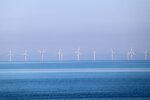Trying to catch the wind: Research project aims to make offshore wind farms more efficient, powerful
Energy experts generally agree: Part of the answer to supplying the U.S. with clean, renewable, and abundant energy is just offshore, blowin' in the wind.
Energy generated by wind turbines floating in the ocean off both U.S. coasts and the Great Lakes has the potential to meet 90% of the country's demand for electricity by 2050, experts say, and offshore wind farms are capable of yielding far more additional energy than their land-based counterparts.
But despite their potential, only seven turbines currently whirl off U.S. coastal waters, though President Joe Biden recently approved a 62-turbine wind farm installation to be placed 15 miles from Martha's Vineyard in Massachusetts. (Compare that number to the 65,000 land-based wind turbines planted in fields and on hillsides across 43 states.)
One impediment to optimizing the potential impact of offshore wind farms is that so little is known about how interactions between the motions of the floating wind turbines and waves affect power output, says Dennice Gayme, a wind-energy expert and mechanical engineer at Johns Hopkins University's Ralph S. O'Connor Sustainable Energy Institute.
"The problem is that the factors influencing offshore wind power are far more complex than those on land, and that gaining that additional knowledge now will avoid costly changes or underperforming wind farms later. These farms take years to build, so we need to do the work now to enable offshore wind to achieve its full potential in contributing to a more sustainable energy system," she said.
Gayme and Charles Meneveau, a professor in Mechanical Engineering, are teaming up with Raúl B. Cal, a professor at Portland State University, on a National Science Foundation-funded project aimed at not only understanding the complex interplay between turbines, wind, and water in offshore wind farms, but also developing a set of simple models and tools that can ensure that these farms are designed and operated to ensure maximum energy efficiency and output.
"When you get the fundamentals right—the fluid mechanics, the control—suddenly, you are not flying blind, and you can create solutions with real efficiency: the kind of solutions we need to accelerate our nation's energy transformation," said Ben Schafer, director of ROSEI and a professor of civil and systems engineering at Johns Hopkins. "Innovations such as these, that enable our energy transformation, are at the heart of our institute's mission."
The collaboration with Portland State University will couple the simulation and modeling efforts with experimental studies within a unique facility at Portland State that merges a wind tunnel and wave tank to conduct scaled controlled experiments. The partnership will enable insights from these state-of-the art experiments to be combined with high-fidelity computer simulations using JHU-developed software to improve understanding of the relationship between incoming streams of air, waves that are generated, and floating turbines. Together this work will allow the researchers to carefully tease apart these dynamics, measuring power outputs under different conditions and identifying which conditions yield greater power production.
"Our goal is to better understand all of the system interactions and then exploit this knowledge to develop simple models/tools that designers can use in practice. Understanding these effects a priori provides the ability to 'get it right' from the beginning, providing a huge positive impact on this country's efforts toward clean, sustainable energy," Gayme said.
Team members also view this project as an opportunity to train graduate students in the interdisciplinary tools of wind energy science and to help high school students understand how wind energy benefits society by reducing greenhouse gases and producing clean, sustainable energy. The researchers will host Baltimore-area high school students for summer research experiences, and Gayme and Meneveau will serve as guest lecturers through Johns Hopkins University's Engineering Innovation, a pre-college program that attracts talented high school students from around the world. They will also work with Cal and the Oregon Museum of Science and Industry on science outreach curriculum centered on the project topics.
"Wind energy provides a unique opportunity for society; however, the scale up that is needed to make a tangible impact in climate change related issues is enormous. Projects like this one help us achieve this scale intelligently and efficiently and are desperately needed. Quest for efficiency at all scales is aligned with the larger mission of our new institute. ROSEI researchers are interested in, and working on, this journey at many levels," Schafer said.
- Source:
- John Hopkins University
- Author:
- Press Office
- Link:
- hub.jhu.edu/...
- Keywords:
- John Hopkins University, offshore, ocean based, offshore, USA, wind farm, efficency, wind turbine, Great Lakes

























